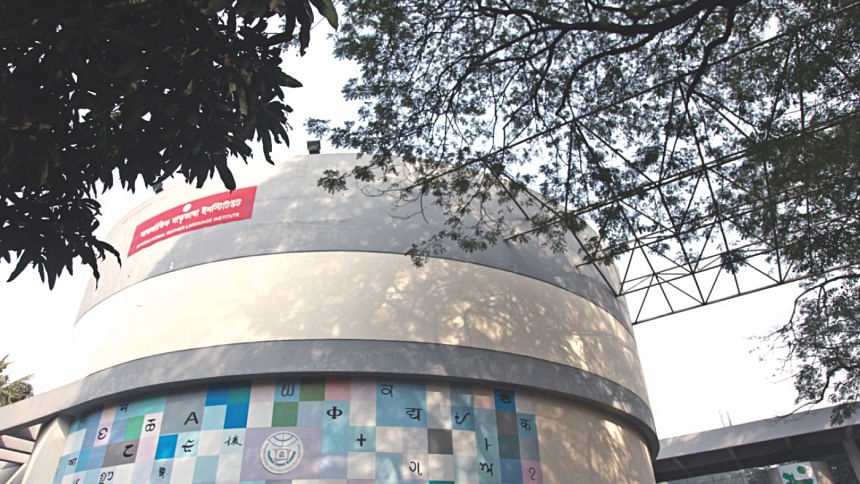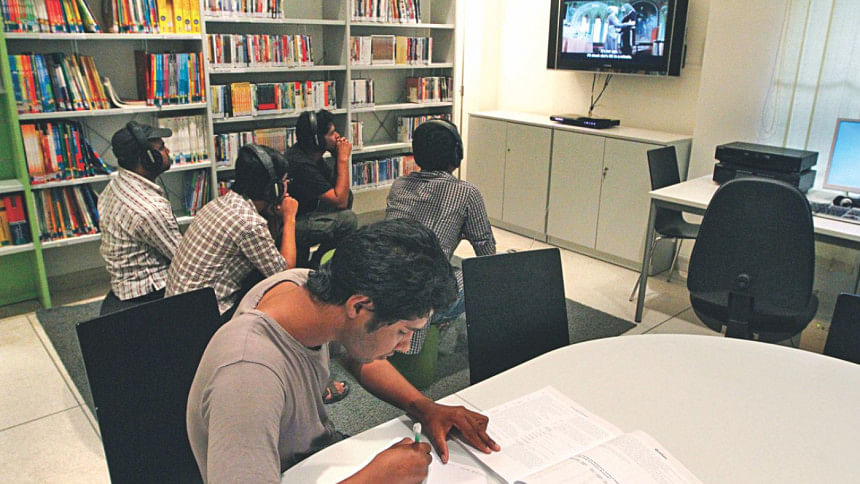LEARNING A THIRD LANGUAGE

MANDARIN
With approximately a billion speakers, Mandarin is the most commonly spoken language in the world. China has economic ties to almost every country and Bangladesh is no exception. Whether as an employer or a potential customer, Chinese presence is growing more and more prominent in Bangladesh, especially for Business majors, and it is getting increasingly important to be able to interact with Chinese clients properly to improve business relations and operations.
"In the present scenario, with the Indian and Chinese economy ballooning, many entrepreneurs or MNCs might consider Mandarin as a language for business graduates. Although it is difficult to choose one particular language based on just the present or near future business climate, it is a vital decision for business graduates," says Mohammad Tanvi Newaz, Assistant Professor at BRAC Business School.

When asked about the benefits of command over Mandarin, Ehsanul Haque Nitol, a BBA student at NSU currently working in the IT industry, says, "Apps like QQ, Qzone and WeChat have a large number of users in China and thanks to them localising their apps, they are now among the top 10 social media. If your app is not available in Chinese, you'll risk leaving an enormous user base untapped."
Also, more and more students are flocking to China in search of affordable higher education and the promise of a bright future. Knowing Mandarin and sitting for the HSK test (Test of Chinese as a foreign language) would increase their chances of getting a scholarship.
The Institute of Modern Languages, Dhaka University offers language courses in Mandarin and other languages. The 3-month crash courses only require copies of O and A Level mark sheets for learners from outside. The fee is very reasonable, it depends on the language and the kind of course you choose; for example, the monthly fee for a crash course on Korean is only BDT 200.
BRAC Institute of Languages (BIL) and the Confucius Institute in NSU also offer short 3-month courses to 1 year certificate courses on Chinese.

FRENCH
Often considered the official language of the arts, French is a popular choice for those seeking bragging rights for being trilingual. If planning to work or immigrate to Canada, knowledge of French could substantially increase chances at a successful application. Also, for students hoping to study in Quebec, knowing French would be immensely valuable since it is a predominantly French-speaking region. Numerous scholarships are also available for those willing to take university courses in French.
However, they would need to demonstrate their knowledge of the language by sitting for the DELF/ DALF tests. There are different stages for different degrees of proficiency and the higher your certification, the more valuable the credentials.
Alliance Francaise de Dhaka offers the perfect learning environment for everyone – from children aged 6 to adults. A small café with a piano, a French library, foreign films and art exhibitions throughout the year, the atmosphere is certainly very French. Adults (aged 16+) are offered extensive or intensive courses, ranging from BDT 5,700 to 12,300. Teenagers (aged 13-15) can have 2-hour classes two days a week for BDT 6,200 or 4-hour classes once a week for BDT 7,500. Completing a level (usually 4 sessions) takes around 12 months, after which students take the DELF exams; passing the exam leads to a European diploma.
BIL at BRAC University, IML NSU and DU also offer courses on French.

ARABIC
The poster child for development and the promise land for wealth and extravagant lifestyles, the Middle East isn't just a destination for blue-collared labour. It is rife with opportunities for engineers, medical professionals and management consultants to name just a few.
Being able to speak Arabic is especially important for those in banking, education and finance where interaction with natives is an integral part of the job.
"Government jobs require you to be able to speak in Arabic so there's no way around it there. And even if private companies don't compel you to know Arabic, it is still something useful to have in your arsenal if you want to work in the Middle East," says Mohd. Mahbub Ul Alam, a former high-up of an airline in Saudi Arabia.
"Your colleagues may speak English if you work in a large company but clients rarely do; not being able to communicate with them effectively would serve as a great road block for you," he adds.
You can find courses on Arabic at The Institute of Modern Languages in Dhaka and Chittagong University, BIL and International Islamic University of Chittagong.

JAPANESE
Japan is home to a rich, multi-faceted culture where ancient traditions and history coexist with cutting edge technology. The Shangri La of the tech industry, Japan is the place to go for engineers, scientists and coders looking to be on the forefront of the IT industry.
"Japanese software companies offer high salary jobs to South-east Asian CSE graduates. You can't expect anyone else to pay nearly as much salary as Japanese software companies are willing to pay a Bangladeshi graduate. It was customary to learn Japanese before starting to work in their industry the last time I checked and I doubt things have changed much in past few years," says a final year CSE student at BUET.
With major tech company headquarters based in Japan, Japanese might be an option worth considering for those vying for a job in the global tech industry.
Kokorozashi: Japanese Cultural Centre in Banani offer courses on Japanese speaking, writing, and reading as well as on Japanese culture, while IML Dhaka University and Dhaka Language Club are slightly cheaper alternatives.
GERMAN
For those budding linguists willing to learn a new language for the sake of it, German may be a good place to start owing to its simple grammar and similarity to English.
Germany is a popular choice for post-graduate studies for Bangladeshi students and command over German would open up opportunities for scholarships and grants.
Goethe-Institut is the best place to learn German. However, courses are pricey and the minimum age requirement is 16. Extensive courses include classes on Fridays and Saturdays, which is BDT 10,000 for beginners (level A1). Intensive courses include classes four days a week, on weekdays, at BDT 20,000 for beginners. Registering for a course is highly competitive as seats are limited.
***
If lumbering out of your room and paying for classes is not an option, we've got you covered too. Here are some apps and websites that'll help you learn a new language from the comfort of your couch.
Duolingo is an app that makes learning a new language much more efficient as it attempts to engage the users through addictive competitions, advancing through levels and social media features.
Memrise is a crowd-sourced language learning tool that uses flash cards, audio, images and unorthodox mechanics involving plants to help users absorb information as fast as possible.
Busuu allows you to interact with native speakers and progress through interactive exams and quizzes with regular feedback.
Links for Reference:
www.bil.bracu.ac.bd
www.afdhaka.org
www.northsouth.edu/academic/ic/
confucius-institute.html
www.dhakalanguageclub.com
www.kokorozashi-jcc.org
www.duolingo.com
www.memrise.com
www.busuu.com
www.du.ac.bd/department/common/
institute_home.php?bodyid=IML\
www.goethe.de/dhaka
PHOTOS: PRABIR DAS & RIDWAN ADID RUPON

 For all latest news, follow The Daily Star's Google News channel.
For all latest news, follow The Daily Star's Google News channel. 



Comments